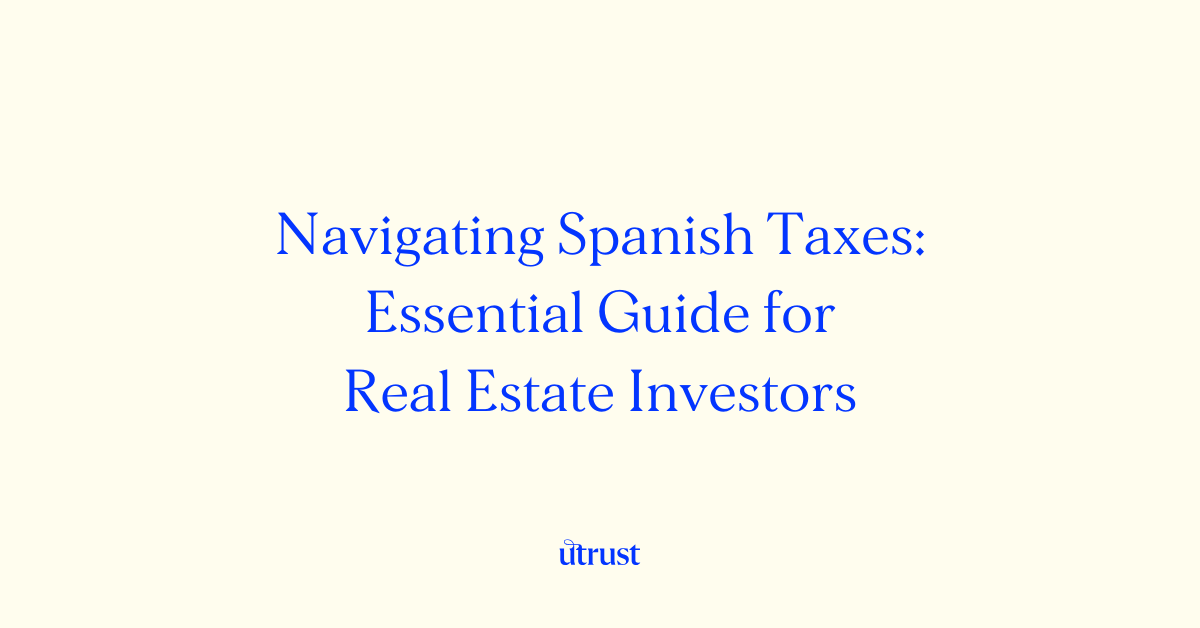Investing in Spanish real estate offers great potential for international investors, but it also comes with a complex tax landscape. Understanding the tax implications of purchasing and owning property in Spain is essential to avoid costly mistakes and to maximize your returns. In this guide, we’ll break down the key tax considerations international investors need to keep in mind when investing in Spanish property.
1. Property Transfer Tax (ITP): Key Tax When Purchasing Property in Spain
One of the most important taxes you’ll encounter when buying property in Spain is the Property Transfer Tax (ITP). This is a regional tax that applies to the transfer of existing properties. It’s calculated based on the purchase price of the property.
Property Transfer Tax Rates by Region:
Key Considerations:
Property Transfer Tax Rates by Region:
- 6% to 11%: Depending on the region where the property is located, the rate can vary. Generally, regions like Madrid and Catalonia have rates on the higher end of the spectrum, while areas like Andalusia offer more competitive rates.
Key Considerations:
- The ITP rate is non-negotiable, so be sure to factor this into your overall investment cost when budgeting for your Spanish property purchase.
2. Value Added Tax (VAT): Applies to New Properties Only
If you're purchasing a new property directly from a developer, you'll be subject to Value Added Tax (VAT). The VAT rate is different depending on the type of property:
Key Considerations:
- 10% for residential properties
- 21% for commercial properties
Key Considerations:
- If you plan to rent out your property after purchase, be aware that VAT can be deducted from expenses related to the rental.
- The VAT on new properties is higher than ITP on existing properties, so be sure to factor in this additional cost when calculating the total investment.
3. Non-Resident Income Tax (IRNR): Tax on Rental Income for Foreign Investors
As an international investor, you'll be subject to Non-Resident Income Tax (IRNR) on any rental income earned from your Spanish property. This tax applies regardless of whether you are residing in Spain or not. The IRNR rates are:
Key Considerations:
- 24% for non-resident property owners.
- 19% for residents of the European Union, Norway, and Iceland.
Key Considerations:
- There are certain deductions available for expenses directly related to the property, such as maintenance costs, property management fees, and mortgage interest.
- You’ll need to file an annual tax return in Spain to report rental income, even if you're incurring a loss.
4. Wealth Tax: Tax on High-Value Property Ownership in Spain
Spain imposes a Wealth Tax on individuals whose total assets, including property, exceed a certain value. International investors who own property with a net value greater than €700,000 are subject to this tax.
Key Considerations:
- The rate ranges from 0.2% to 3.5%, and varies progressively depending on the value of the assets.
- Exemptions are available for primary residences, up to €300,000, but only if the property is located in Spain.
Key Considerations:
- Wealth tax is calculated on the net value of your assets, so you must subtract any liabilities (mortgages) from the value of your properties.
- Wealth Tax should be factored into your overall investment strategy, especially for those with larger portfolios.
5. Inheritance Tax: Preparing for Future Generations
Inheritance Tax is an important consideration for international investors who plan on passing their Spanish property down to heirs. Spain’s inheritance laws are complex, and tax rates can vary significantly depending on the relationship between the deceased and the heir.
Key Considerations:
- Rates typically range from 7.65% to 34%, depending on the heir’s proximity to the deceased.
- Heirs who are direct descendants (children, spouse) tend to benefit from lower tax rates, while distant relatives or unrelated individuals may face much higher taxes.
Key Considerations:
- Consider establishing an estate plan to minimize inheritance tax burdens.
- International investors should consult with Spanish legal experts to ensure that their estate is structured efficiently for tax purposes.
Navigating Taxes in Spain's Real Estate Market
Spain’s real estate market offers lucrative opportunities, but understanding the tax implications is crucial for international investors. From Property Transfer Tax (ITP) to VAT on new properties, and from Wealth Tax to Inheritance Tax, being well-informed can help you make smart, profitable decisions.
Whether you're purchasing property, earning rental income, or planning to pass on your Spanish assets, working with local experts ensures that you remain compliant while optimizing your investment returns.
At UTRUST, we specialize in providing expert legal advice and guidance through Spain’s real estate tax landscape, helping investors like you navigate the complexities of these taxes and maximize their returns. Contact us today via info@utrust.es to learn how we can help you manage your investment efficiently.
Whether you're purchasing property, earning rental income, or planning to pass on your Spanish assets, working with local experts ensures that you remain compliant while optimizing your investment returns.
At UTRUST, we specialize in providing expert legal advice and guidance through Spain’s real estate tax landscape, helping investors like you navigate the complexities of these taxes and maximize their returns. Contact us today via info@utrust.es to learn how we can help you manage your investment efficiently.
